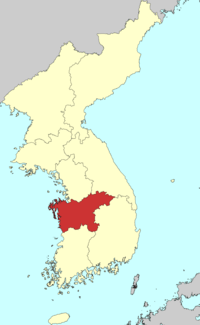Chungcheong dialect
The Chungcheong dialects of the Korean language are spoken in the Chungcheong (Hoseo) region of South Korea, including the metropolitan city of Daejeon. Chungcheong dialect can be divided into two categories: the Northern Chungcheong dialect, notable for its similarity capital Gyeonggi region speech, and the Southern dialect, which is similar to the Jeolla dialect. This dialect is notable for its slow enunciations, vowel changes, and unique jargon. However, due to the proliferation of Seoul standardization in cities such as Daejon, Chungcheong dialect is difficult to hear outside of the rural regions of the province.
| Chungcheong | |
|---|---|
| 충청도 사투리 | |
 | |
| Native to | South Korea |
| Region | Hoseo |
| Dialects |
|
| Language codes | |
| ISO 639-3 | – |
| Glottolog | chun1247[1] |
| Chungcheong dialect | |
| Hangul | 충청도 방언 |
|---|---|
| Hanja | 忠淸道 방언 |
| Revised Romanization | Chungcheong bangeon |
| McCune–Reischauer | Ch'ungch'ŏng pangŏn |
Pronunciation
Vowels
Similar to the Jeolla dialect, Chungcheong dialect often transforms the vowel <ㅐ> with <ㅕ>instead of <ㅑ>, which may be more common in other dialects.[2] Linguist Do Suhee reports that the Chungcheong dialect experiences a vowel shift that raises vowels to place them further forward in the mouth towards the front, resulting in changes like <ㅏ> (a) raising to <ㅔ> (e) and <ㅡ> (ɨ) fronting to become <ㅣ> (i).[3]
Consonants
Do Suhee found that the Chungcheong dialect increases the tenseness of lax stops when in the initial position. For example, the lax stops <ㄱ,ㄷ,ㅂ> (k, t, p) transform into /ㄲ, ㄸ, ㅃ/ (kk, tt, pp) when in the word-initial position.[3]
Distinct Phrases
The Chungcheong dialect usually replaces the standard '~겠다' (gettda) at the end of sentences with '~것다' (geotda) and uses phrases such as '기여' (giyeo) (yes) instead of the standard '맞다' (matda) and '근디'(geundi) (but) instead of '그런데' (geureonde). Chungcheong people may occasionally pronounce the ending form '~이니까' (inikka) with '~이니께' (inikke).[2]
References
- Hammarström, Harald; Forkel, Robert; Haspelmath, Martin, eds. (2017). "Ch'ungch'ongdo". Glottolog 3.0. Jena, Germany: Max Planck Institute for the Science of Human History.
- "Chungcheong", Glottolog 2.2, Max Planck Institute for Evolutionary Anthropology, 2013, retrieved 2020-05-04
- 도, 수희 (1987). "충청도 방언의 특징과 그 연구". 국어생활: 88–109 – via National Institute of Korean language.